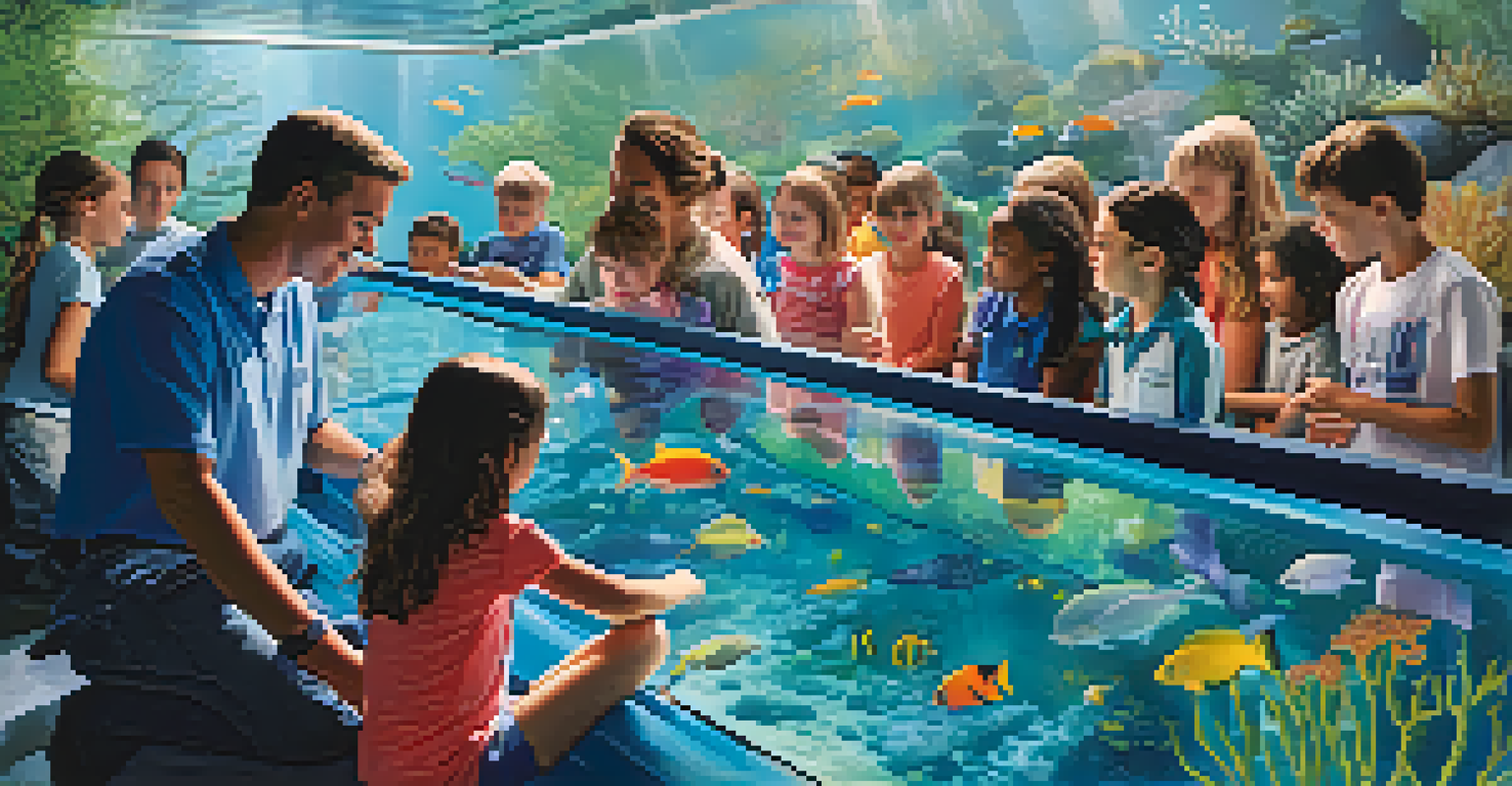Marine Research Institutions in San Diego

Overview of San Diego's Marine Research Landscape
San Diego is often hailed as a hub for marine research, thanks to its unique coastal location and diverse marine ecosystems. With access to the Pacific Ocean, researchers here study everything from marine biology to oceanography. This vibrant landscape is home to various institutions dedicated to understanding and preserving our oceans.
The ocean is a central component of the global ecosystem and plays a vital role in the health of our planet.
The institutions in San Diego not only focus on local marine environments but also contribute to global marine science initiatives. Their work supports conservation efforts, sustainable fishing practices, and understanding the impacts of climate change. Each organization plays a vital role in advancing marine research and education.
As you explore these institutions, you'll find a blend of academic research, public outreach, and community engagement. This creates a rich environment for both scientists and the public to learn more about our oceans and their importance to our planet.
Scripps Institution of Oceanography: A Global Leader
One of the most renowned marine research institutions in San Diego is the Scripps Institution of Oceanography, part of the University of California, San Diego. Founded in 1903, Scripps has been at the forefront of oceanographic research for over a century. Its scientists conduct groundbreaking studies on climate change, marine ecosystems, and ocean health.

Scripps is not only known for its research but also for its commitment to education and public engagement. The institution offers various programs for students and the community, including public lectures and educational tours. This engagement helps raise awareness about the importance of marine conservation.
San Diego: Marine Research Hub
San Diego is a vital center for marine research, with institutions dedicated to studying and preserving diverse ocean ecosystems.
Additionally, Scripps operates the Birch Aquarium, which showcases marine life and research findings to the public. This institution serves as a bridge between scientific research and community understanding, making marine science accessible to everyone.
The Ocean Discovery Institute: Inspiring Future Scientists
The Ocean Discovery Institute is another gem in San Diego's marine research scene, focusing on education and outreach. Their mission is to inspire the next generation of scientists and conservationists through hands-on learning experiences. They primarily work with underserved communities to foster a love for marine science among young people.
We do not inherit the earth from our ancestors; we borrow it from our children.
Through programs like the 'SeaChange' initiative, students engage in real-world scientific research, learning about marine ecosystems and environmental stewardship. This not only educates them about the ocean but also empowers them to take action for its protection. The institute's efforts are crucial in building a more diverse future in marine science.
The Ocean Discovery Institute exemplifies how education and research can go hand-in-hand. By cultivating a passion for marine science in young learners, they contribute to a more informed and proactive society regarding ocean conservation.
The Hubbs-SeaWorld Research Institute: Conservation Focus
The Hubbs-SeaWorld Research Institute is dedicated to conservation and the sustainable use of marine resources. Founded in 1963, this non-profit organization conducts research that directly informs wildlife conservation efforts. Their work often involves studying marine mammals, fish populations, and habitat restoration.
One of their notable projects includes researching the California gray whale's migratory patterns to understand their behaviors and threats. Such studies are essential for developing effective conservation strategies and policies. Their findings contribute significantly to the protection of marine species and habitats.
Community Engagement in Research
Local institutions actively involve the community in marine research through citizen science initiatives, fostering ocean stewardship.
The Hubbs-SeaWorld Research Institute also collaborates with local universities and organizations to enhance marine research efforts. By fostering partnerships, they amplify the impact of their research and broaden the scope of marine conservation initiatives in the region.
California Sea Grant: Bridging Science and Policy
California Sea Grant is another key player in San Diego's marine research landscape, focusing on promoting sustainable coastal and ocean resources. This program operates under the National Oceanic and Atmospheric Administration (NOAA) and works closely with local communities, policymakers, and research institutions. Their goal is to ensure that scientific research informs effective ocean management.
Through their various projects, California Sea Grant addresses pressing issues such as climate change impacts on coastal communities and the conservation of marine biodiversity. They provide critical data and expertise to help shape policies that protect our ocean resources. Their work exemplifies the vital link between research and real-world application.
Moreover, California Sea Grant prioritizes outreach and education, offering workshops and resources for community members and stakeholders. By empowering local leaders with knowledge, they help foster a culture of stewardship and responsible management of marine resources.
The Role of Research Vessels in Marine Studies
Research vessels are the lifeblood of marine studies, playing a crucial role in data collection and exploration. In San Diego, institutions like Scripps operate several research vessels that venture into the Pacific Ocean to gather valuable information about marine life and ocean conditions. These vessels are equipped with state-of-the-art technology to conduct various scientific investigations.
Onboard scientists can study everything from water quality to marine biodiversity, often engaging in long-term monitoring projects. This data is essential for understanding changes in ocean ecosystems and informing conservation efforts. Research vessels allow scientists to reach parts of the ocean that are otherwise inaccessible, opening up new avenues for discovery.
Innovative Future in Marine Science
The future of marine research in San Diego will be shaped by technological advancements and collaborative efforts to tackle ocean challenges.
Additionally, these vessels often serve as a platform for educational opportunities, allowing students and aspiring scientists to participate in real research expeditions. Such experiences not only enhance their learning but also foster a deeper connection to the ocean and its challenges.
Community Involvement in Marine Research
Community involvement is a vital aspect of marine research in San Diego. Many institutions actively engage local residents in various projects, fostering a sense of stewardship towards the ocean. This collaboration often involves citizen science initiatives, where community members participate in data collection and monitoring efforts.
For instance, beach clean-up events and marine wildlife surveys allow residents to contribute directly to research efforts. These activities not only help gather valuable data but also raise awareness about the importance of preserving our marine environments. Involving the community creates a collective responsibility for ocean conservation.

Furthermore, local marine research institutions frequently host public events, workshops, and lectures to educate the community about marine science. This open dialogue encourages residents to connect with researchers, ask questions, and learn how they can help protect the oceans. It’s a beautiful synergy that enhances both scientific research and community engagement.
The Future of Marine Research in San Diego
As we look to the future, the marine research landscape in San Diego is poised for exciting developments. The ongoing challenges posed by climate change and habitat degradation will require innovative solutions and collaborative efforts. Institutions in San Diego are already leading the charge by incorporating new technologies and methodologies into their research.
For example, advancements in remote sensing and data analytics are paving the way for more efficient monitoring of ocean health. These tools enable researchers to gather and analyze data more effectively, leading to more informed decisions regarding marine conservation. The future of marine research will undoubtedly be driven by these technological innovations.
Moreover, as public interest in marine conservation continues to grow, we can expect increased collaboration between research institutions and community stakeholders. This partnership will be crucial in creating a sustainable future for our oceans, ensuring that the knowledge gained through research translates into meaningful action for marine protection.